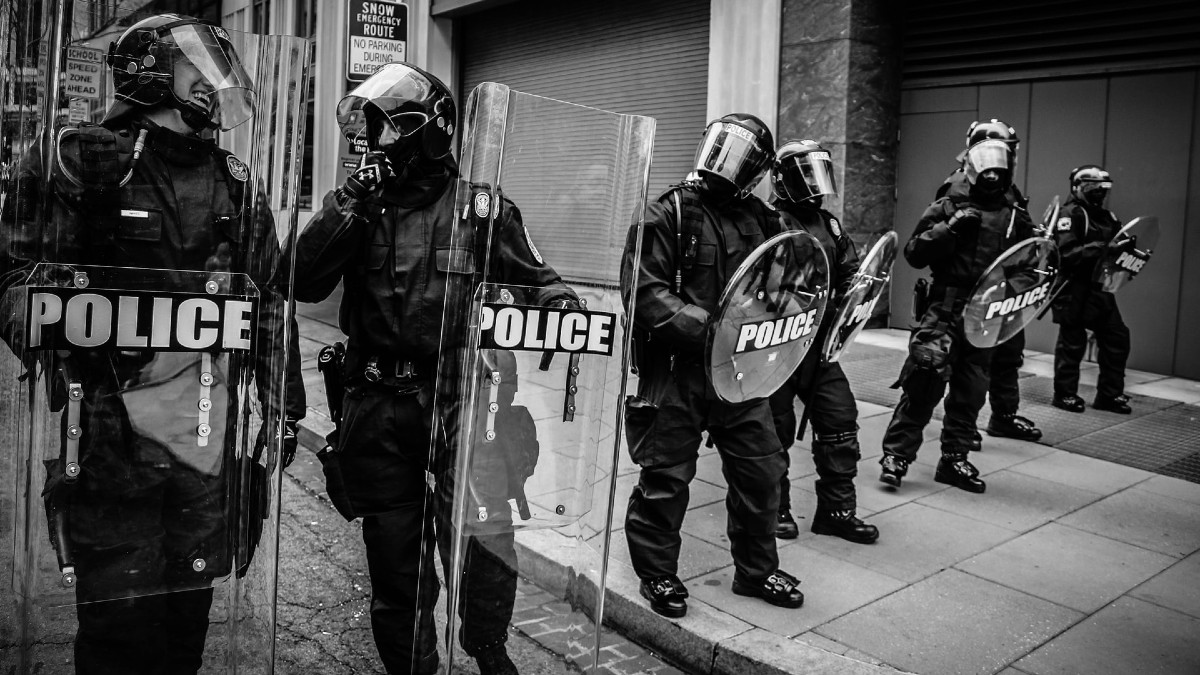On Thursday 27 January 2022, our panel of leading criminologists and development practitioners explored whether evidence-based policing can advance police reform overseas.
Dr Rachel Kleinfeld, Professor Lawrence Sherman and Ziyanda Stuurman highlighted the importance of acknowledging the context within which reform can take place and evidence-based policing can be applied. Governance and political infrastructures need to be first assessed before a more nuanced discussion can take place about how to implement change. While an evidence-based approach is important for police reform design, a comprehensive understanding of the context is key for ensuring sustainable implementation.
 The event was hosted by the Department of International Relations, LSE, and developed and chaired by Dr Liam O’Shea, DINAM Research Fellow and lead for the www.howtoreformthepolice.com project.
The event was hosted by the Department of International Relations, LSE, and developed and chaired by Dr Liam O’Shea, DINAM Research Fellow and lead for the www.howtoreformthepolice.com project.
- Find out more about this event and speakers
- Listen to or download the audio podcast (90 mins)
- Watch on YouTube (90 mins)

Culture eats strategy for breakfast
Structure, culture and country contexts
Evidence-based policing is not guaranteed to deliver less corrupt, violent or more equitable and effective police. Its impact is itself dependent on wider structural and cultural conditions. Where issues in policing are embedded in big structural problems, the impact of evidence-based, tactical interventions, which are usually supported from evidence from Western contexts, is likely to be limited. Succinctly summarised by Dr Rachel Kleinfeld: “Culture eats strategy for breakfast”.
Legacy effects shape a country’s governance structure, including its model of policing. Colonial legacies, governance structures, the structure of the state or a country’s cultural and social identity can all have tangible implications on current policing practices. The unique histories of an area shape the origins of policing institutions, ultimately shaping their function within modern society.
 Professor Lawrence Sherman summarised these differences by contrasting the reactive ‘fire brigade’ model with a proactive ‘customer service’ model. ‘Fire brigade’ police, frequently observed where there are legacies of colonial policing, interact with the public to shut down instances of collective action. ‘Customer service’ police, more common in Global North contexts like the UK and the USA, reflect a more modern approach of crime prevention and reduction, with a more interactive (though often still flawed) relationship with the public. These differences reflect the different functions a police force can have due to its unique history and the prevailing cultures.
Professor Lawrence Sherman summarised these differences by contrasting the reactive ‘fire brigade’ model with a proactive ‘customer service’ model. ‘Fire brigade’ police, frequently observed where there are legacies of colonial policing, interact with the public to shut down instances of collective action. ‘Customer service’ police, more common in Global North contexts like the UK and the USA, reflect a more modern approach of crime prevention and reduction, with a more interactive (though often still flawed) relationship with the public. These differences reflect the different functions a police force can have due to its unique history and the prevailing cultures.
Ultimately many policing institutions, particularly those still operating in the Global South, were born from a problematic legacy which endures today, with little to no pretence that their function is, or was, to serve the public.
Many policing institutions, particularly those still operating in the Global South, were born from a problematic legacy which endures today, with little to no pretence that their function is, or was, to serve the public.
Reciprocal trust-building
For evidence-based policing to work in practice trust is essential – a topic emphasised by all speakers. It is important to establish trust in a reciprocal way, both between the public and the police and between reformers and front-line officers.
Police institutions can be resistant to evidence-based change when they do not trust the reform being implemented, often preferring instead to develop practice based on experience, judgment and emotion. Implementation is more successful when actors feel confident in reform as this achieves buy-in from those adopting change.
Police also need to earn trust from the public as well. Tackling crime effectively relies on good public-police relations, with police relying on tips from the public to solve and respond to criminal activity. Trust-building is an important starting point for reform especially where there are poor community and police relations. One effective way of building trust in the police may be to diversify police forces and recruit more police officers who better represent the communities they serve.
One effective way of building trust in the police may be to diversify police forces and recruit more police officers who better represent the communities they serve.
Community policing
Community policing is frequently discussed by academics, policy makers and activists but what does it actually mean? It is not just one strategy but instead an umbrella term which covers a range of different practices, particularly when it comes to implementing reform. Though initiatives may share design principles, in practice it is difficult to distinguish community policing from other forms of policing.
Overall, community policing is not yet reliably evidenced and findings can differ greatly. Many practitioners and researchers see merit in involving communities in policing and working alongside local residents. There is some evidence such measures can improve public perceptions of the police, though their  impact on reducing crime is less obvious. This is also true outside of traditional police reform. Ziyanda Stuurman discussed ‘street committees’ in South Africa, which historically provided more effective means of policing than the police. Many of these are still active today and recognised in various forms by communities, governments and the police, creating community policing forums which are used to influence how the police operate within different areas.
impact on reducing crime is less obvious. This is also true outside of traditional police reform. Ziyanda Stuurman discussed ‘street committees’ in South Africa, which historically provided more effective means of policing than the police. Many of these are still active today and recognised in various forms by communities, governments and the police, creating community policing forums which are used to influence how the police operate within different areas.
Community policing is not without risk. It can easily slide into vigilantism, be co-opted by the police and focus on narrow issues. But though the concept of community policing lacks clarity, engagement with communities is important to building the trust required to develop sustainable and embedded reform.
Community policing is not without risk. It can easily slide into vigilantism, be co-opted by the police and focus on narrow issues.
Locally-informed reform and adapted evidence
Evidence-based policing is vital to ensuring reform is based upon the best available, tangible knowledge of ‘what works’ in policing. However, the current evidence-base is not always directly applicable overseas. Evidence needs to be adapted to local settings and informed by local knowledge.
Evidence-based policing, indeed, effective policing writ-large, also depends on trust. Working collaboratively with local actors, including the police and local communities, helps to ensure reform is embedded in the local area to work towards sustainable practices. Aside from informing the design itself, it also ensures police, communities and other stakeholders are invested in seeing changes become embedded.
Evidence-based policing, indeed, effective policing writ-large, also depends on trust.
Banner photo by Oladipo Adejumo on Unsplash





